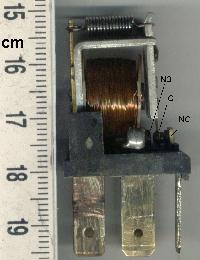Relay






Relay is an electromechanical device or electronic component that is used to control a circuit by a low-power signal, or where several circuits must be controlled by one signal. Relays are found in many applications including telecommunication, automotive technologies, and large-scale electrical systems like those used in power distribution networks.
History[edit]
The concept of the relay can be traced back to the early 19th century with the invention of the electromagnet by William Sturgeon in 1825. The first practical application of relays was in telegraph systems, allowing for long-distance communication without the need for large amounts of power to be sent over the wires. This principle was further developed and utilized in various fields of electronics and electrical engineering.
Types of Relays[edit]
Relays can be broadly classified into two categories: electromechanical relays and solid-state relays.
Electromechanical Relays[edit]
Electromechanical relays use an electromagnet to mechanically operate a switch. They can be further divided into several types, including:
- Reed Relay: Uses a reed switch, which is operated by a magnetic field generated by an electromagnet.
- Power Relay: Designed to switch a larger amount of power. Often used in industrial and appliance control.
- Contactor: A heavy-duty power relay used to switch electric motors and lighting loads.
Solid-State Relays[edit]
Solid-state relays (SSRs) use semiconductor devices to switch a circuit on or off. Unlike electromechanical relays, SSRs have no moving parts, which results in faster switching times and increased reliability. They are often used in applications where high-speed switching is required.
Applications[edit]
Relays are used in a wide range of applications, including:
- Automation systems, where they are used to control the operations of machines.
- Automotive industry, for controlling headlights, alarms, and other electrical components in vehicles.
- Telecommunications, for switching signals in telephone exchanges and internet routers.
- Power systems, for controlling the flow of electricity in distribution networks, and protecting electrical equipment from overload and faults.
Advantages and Disadvantages[edit]
Advantages[edit]
- Isolation: Relays provide electrical isolation between the control circuit and the circuit being controlled.
- Versatility: They can control both AC and DC currents, and switch multiple circuits with a single signal.
- Safety: Electromechanical relays can handle high current loads, making them suitable for industrial applications.
Disadvantages[edit]
- Wear and Tear: Electromechanical relays have moving parts that can wear out over time, leading to failure.
- Switching Speed: They are generally slower than solid-state relays, which can be a limitation in some applications.
- Size: Electromechanical relays are larger than solid-state relays, which can be a disadvantage in compact electronic devices.
See Also[edit]
Ad. Transform your life with W8MD's Budget GLP-1 injections from $75


W8MD offers a medical weight loss program to lose weight in Philadelphia. Our physician-supervised medical weight loss provides:
- Weight loss injections in NYC (generic and brand names):
- Zepbound / Mounjaro, Wegovy / Ozempic, Saxenda
- Most insurances accepted or discounted self-pay rates. We will obtain insurance prior authorizations if needed.
- Generic GLP1 weight loss injections from $75 for the starting dose.
- Also offer prescription weight loss medications including Phentermine, Qsymia, Diethylpropion, Contrave etc.
NYC weight loss doctor appointmentsNYC weight loss doctor appointments
Start your NYC weight loss journey today at our NYC medical weight loss and Philadelphia medical weight loss clinics.
- Call 718-946-5500 to lose weight in NYC or for medical weight loss in Philadelphia 215-676-2334.
- Tags:NYC medical weight loss, Philadelphia lose weight Zepbound NYC, Budget GLP1 weight loss injections, Wegovy Philadelphia, Wegovy NYC, Philadelphia medical weight loss, Brookly weight loss and Wegovy NYC
|
WikiMD's Wellness Encyclopedia |
| Let Food Be Thy Medicine Medicine Thy Food - Hippocrates |
Medical Disclaimer: WikiMD is not a substitute for professional medical advice. The information on WikiMD is provided as an information resource only, may be incorrect, outdated or misleading, and is not to be used or relied on for any diagnostic or treatment purposes. Please consult your health care provider before making any healthcare decisions or for guidance about a specific medical condition. WikiMD expressly disclaims responsibility, and shall have no liability, for any damages, loss, injury, or liability whatsoever suffered as a result of your reliance on the information contained in this site. By visiting this site you agree to the foregoing terms and conditions, which may from time to time be changed or supplemented by WikiMD. If you do not agree to the foregoing terms and conditions, you should not enter or use this site. See full disclaimer.
Credits:Most images are courtesy of Wikimedia commons, and templates, categories Wikipedia, licensed under CC BY SA or similar.
Translate this page: - East Asian
中文,
日本,
한국어,
South Asian
हिन्दी,
தமிழ்,
తెలుగు,
Urdu,
ಕನ್ನಡ,
Southeast Asian
Indonesian,
Vietnamese,
Thai,
မြန်မာဘာသာ,
বাংলা
European
español,
Deutsch,
français,
Greek,
português do Brasil,
polski,
română,
русский,
Nederlands,
norsk,
svenska,
suomi,
Italian
Middle Eastern & African
عربى,
Turkish,
Persian,
Hebrew,
Afrikaans,
isiZulu,
Kiswahili,
Other
Bulgarian,
Hungarian,
Czech,
Swedish,
മലയാളം,
मराठी,
ਪੰਜਾਬੀ,
ગુજરાતી,
Portuguese,
Ukrainian
